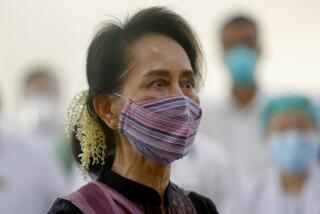Mandela Reported Suffering From Tuberculosis
- Share via
JOHANNESBURG, South Africa — Nelson R. Mandela, the 70-year-old jailed black nationalist leader, has contracted tuberculosis and had been ill for days and coughing up blood when he was taken to a Cape Town hospital last week, his attorney said Tuesday.
“He’s very thin. He’s on his feet, but very suddenly he looks very old,” the lawyer, Ismail Ayob, said after seeing his client Tuesday morning.
Two days earlier, doctors at Tygerberg Hospital, where Mandela is being treated in a wing reserved for blacks, said he had only a chronic lung inflammation and was recovering well.
Dr. J. G. L. Strauss, the hospital superintendent, refused Tuesday night to say whether Mandela had tuberculosis, a highly contagious airborne virus that usually affects the lungs.
“We stick by what Mandela has authorized us to say,” Strauss said.
Asked whether Mandela’s life is in danger, Ayob said, “I can’t say until we get permission for our own doctors to see him.” He said he learned of the diagnosis from one of the hospital’s doctors.
Tuberculosis is a growing problem in this country, with more than 55,000 cases reported annually, according to the South Africa National Tuberculosis Assn. About 3,000 people die every year here of the disease.
Mandela’s sudden illness, after more than 26 years in prison, could present the white minority-led government with one of its most serious crises in many months, perhaps forcing South Africa to release the black leader soon on humanitarian grounds.
Mandela, serving a life sentence for sabotage and conspiracy to overthrow the government, has become an international symbol of black resistance to apartheid. He is the leader of the outlawed African National Congress, the principal guerrilla group fighting the South African government.
Neglect Charged
Earlier Tuesday, the ANC issued a statement from its headquarters in Lusaka, Zambia, accusing the government of “callous neglect” in treating Mandela.
The statement said the ANC was “reliably informed that before hospitalization (Mandela) was lying in bed, unable to eat and exercise, and had difficulties of speech for a whole week. Although the prison authorities were obviously aware that he was ill, nothing was done.”
However, the South African Prisons Department, in a statement late Tuesday, said Mandela’s illness, which it did not specify, was treated promptly. It said Mandela became ill July 28 and was seen by doctors in his prison cell regularly.
Mandela’s family, including his wife, Winnie, appealed to President Pieter W. Botha through a family spokesman Tuesday to allow its own team of doctors to see the patient. Botha did not immediately respond.
On Sunday, the government said Mandela had undergone minor surgery Saturday to drain fluid from his left lung. It was Mandela’s first foray outside prison walls since 1982.
After seeing her husband Tuesday, Winnie Mandela was surrounded by hundreds of patients and hospital staff. She raised her fist in a black power salute as black and mixed-race patients shouted “Viva Mandela!”
The racially segregated hospital is being guarded by police and the fourth floor, where Mandela’s room is located, has been sealed off.
Pressure Builds for Release
International pressure for the black leader’s release has been building in recent weeks among supporters as well as opponents of the government. Government officials have acknowledged that Mandela’s death in jail would likely make him a martyr and trigger uncontrolled violence among angry blacks. But the government also fears that Mandela’s release could result in similar civil uprisings.
As recently as July 29, his attorney was telling reporters that Mandela was in excellent health and good spirits. Mandela, now gray-haired, had been riding an exercise bicycle for hours each morning and had the taut skin of a man much younger than his years, Ayob said.
But “it is clear that his condition has been deteriorating for some time,” Ayob said Tuesday. When Mandela was taken to the hospital, he was unable to speak and was spitting up blood, Ayob said Mandela told him.
No Answers
Ayob, speaking with reporters upon his return to Johannesburg, said a doctor had given him and Winnie Mandela the diagnosis. The doctor refused to answer Mrs. Mandela’s questions, Ayob said.
Tuberculosis is a severe problem in South Africa. It is especially prevalent among the country’s 26 million blacks, doctors say, because they live in poorly ventilated, overcrowded homes where it easily spreads.
Of the 57,457 new cases of tuberculosis reported in South Africa in 1986, for example, 43,000 were cured and 3,100--slightly more than 5%--died. South Africa’s health care is generally highly regarded internationally.
Johannesburg Bureau Assistant Mike Cadman contributed to this article.
More to Read
Sign up for Essential California
The most important California stories and recommendations in your inbox every morning.
You may occasionally receive promotional content from the Los Angeles Times.














